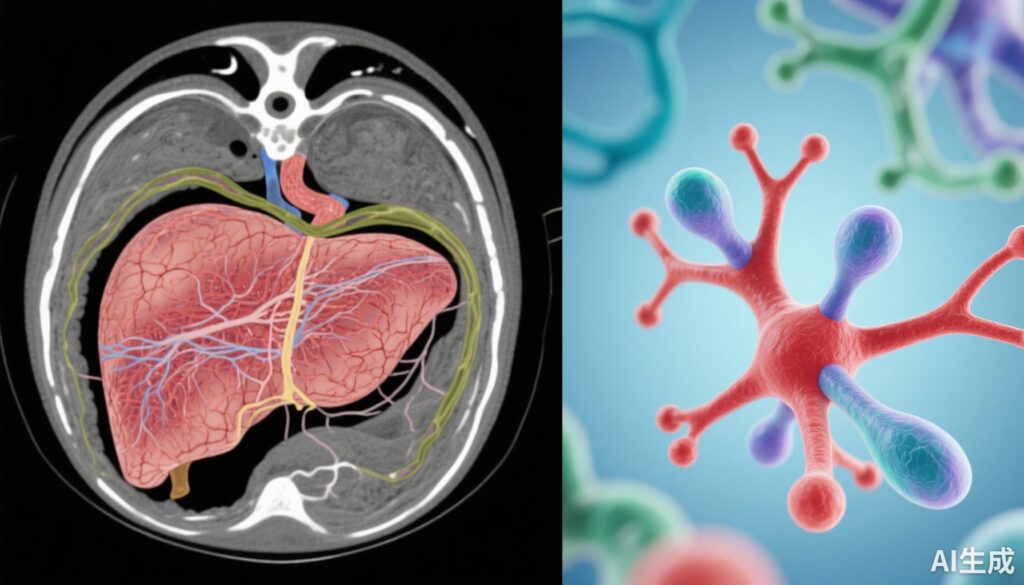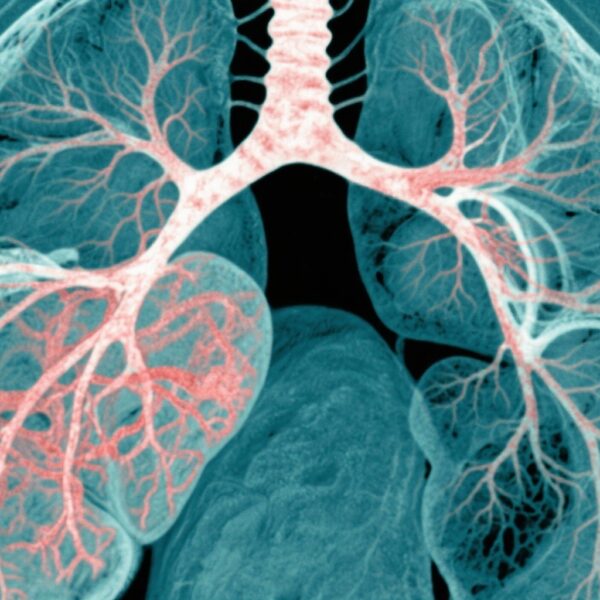Highlight
– Bexotegrast, an oral dual αvβ6/αvβ1 integrin inhibitor, was well tolerated with mild to moderate adverse events in patients with PSC and liver fibrosis.
– Exploratory pharmacodynamic markers, including ELF score and MRI parameters, showed numerically less progression or improvement with bexotegrast versus placebo.
– The trial supports targeting integrin-mediated TGF-β activation as a novel therapeutic strategy in PSC.
– Further studies are needed to confirm clinical efficacy and long-term safety.
Study Background and Disease Burden
Primary sclerosing cholangitis (PSC) is a rare, chronic cholestatic liver disease characterized by progressive inflammation and fibrosis of the bile ducts leading to biliary strictures, portal hypertension, and ultimately liver failure or cholangiocarcinoma. Despite significant morbidity and mortality, PSC’s etiology remains poorly understood, and no approved medical therapies effectively halt or reverse disease progression. The unmet need for safe, efficacious interventions to slow fibrosis and improve outcomes in PSC is substantial.
Recent insights implicate transforming growth factor-beta (TGF-β) signaling, activated via αvβ6 and αvβ1 integrins expressed on cholangiocytes and hepatic stellate cells, as a key driver of fibrogenesis. Bexotegrast (PLN-74809) is an orally administered small molecule inhibitor selectively targeting αvβ6 and αvβ1 integrins, thereby aiming to disrupt TGF-β activation and subsequent fibrotic cascades. The INTEGRIS-PSC Phase II trial was designed to evaluate the safety, tolerability, and exploratory pharmacodynamics of bexotegrast in PSC patients with liver fibrosis.
Study Design
INTEGRIS-PSC was a randomized, double-blind, placebo-controlled, dose-ranging Phase II study enrolling 117 participants with diagnosed PSC and evidence of liver fibrosis. Participants were allocated in a 3:1 ratio to receive once-daily oral bexotegrast or matching placebo across three dose cohorts:
- Part 1: 40 mg bexotegrast versus placebo for 12 weeks (n=22 and 7 respectively)
- Part 2: 80 mg, 160 mg doses versus placebo for 12 weeks (n=21, 21, and 10 respectively)
- Part 3: 320 mg dose versus placebo for up to 40 weeks (n=27 and 13 respectively)
The primary endpoint was safety, assessed by the incidence of treatment-emergent adverse events (TEAEs). Secondary exploratory pharmacodynamic endpoints included biochemical markers (alkaline phosphatase), enhanced liver fibrosis (ELF) scores, neoepitope-specific N-terminal pro-peptide of type III collagen (PRO-C3), liver stiffness measurements (transient elastography), magnetic resonance imaging (MRI) using gadoxetate contrast, and patient-reported outcomes on itch severity using the Itch Numeric Rating Scale.
Key Findings
Safety and Tolerability: Across all dose cohorts, bexotegrast was well tolerated with a similar overall incidence of TEAEs compared to placebo (72.7% vs. 70.0%). Most adverse events were mild to moderate in severity, including gastrointestinal symptoms and fatigue. Importantly, no serious adverse events related to the study drug were reported.
Pharmacodynamic Effects: At 12 weeks, participants receiving bexotegrast exhibited numerically less progression or improvement in several exploratory markers associated with fibrogenesis and liver function compared to placebo. ELF scores and PRO-C3 levels, both indicative of fibrotic activity and extracellular matrix remodeling, showed a trend toward stabilization or reduction with bexotegrast treatment.
Imaging assessments using gadoxetate-enhanced MRI demonstrated favorable changes in liver fibrosis and function parameters at week 12, which persisted and even improved by week 24 in participants treated with the highest dose (320 mg) of bexotegrast.
Liver stiffness measurements also suggested less fibrotic progression with active therapy compared to placebo; however, these findings were exploratory and limited by sample size and study duration.
Patient-reported itch scores remained largely unchanged, indicating no significant benefit or worsening in pruritus during the study period.
Expert Commentary
The INTEGRIS-PSC trial offers promising insights into the tolerability and potential antifibrotic activity of targeting αvβ6 and αvβ1 integrins in PSC, a condition notoriously resistant to pharmacologic intervention. By inhibiting integrin-mediated activation of TGF-β, bexotegrast addresses a key pathological mechanism underpinning liver fibrosis.
While the study’s primary goal was safety and exploratory pharmacodynamics rather than definitive efficacy, the observed trends in biomarker stabilization and improved MRI fibrosis-related parameters are encouraging. Nevertheless, the relatively short treatment duration, modest sample size, and lack of histological endpoints limit firm conclusions about clinical benefit.
Future larger-scale, longer randomized trials incorporating clinical endpoints such as liver function, progression to cirrhosis, transplantation need, and quality of life assessments will be essential. The integration of noninvasive fibrosis biomarkers and advanced imaging will remain critical for assessing therapeutic response in PSC.
Conclusion
Bexotegrast demonstrated a favorable safety profile in this Phase II study involving participants with PSC and liver fibrosis. Early pharmacodynamic data suggest that dual inhibition of αvβ6 and αvβ1 integrins may attenuate fibrogenic progression in PSC by modulating TGF-β signaling pathways. This study supports further investigation of integrin-targeted therapies as a novel disease-modifying strategy in PSC, addressing an urgent unmet clinical need. Rigorous future trials are warranted to establish long-term efficacy and impact on clinically meaningful outcomes.
Funding and ClinicalTrials.gov
This study was funded by Pliant Therapeutics, Inc. The trial is registered at ClinicalTrials.gov under identifier NCT04480840.
References
- Hirschfield GM, Kowdley KV, Trivedi PJ, et al. Phase II INTEGRIS-PSC trial of bexotegrast, an αvβ6/αvβ1 integrin inhibitor, in primary sclerosing cholangitis. J Hepatol. 2025 Sep 26:S0168-8278(25)02498-5. doi: 10.1016/j.jhep.2025.09.016. Epub ahead of print. PMID: 41016442.
- Rothstein KD, Kim WR. Treatment of Primary Sclerosing Cholangitis: Focus on Fibrogenesis and Immunomodulation. Clin Liver Dis. 2023;17(2):89-103.
- Sekhar V, Heneghan MA. Advances in the Pathogenesis and Treatment of Primary Sclerosing Cholangitis. Nat Rev Gastroenterol Hepatol. 2022;19(10):619-632.



